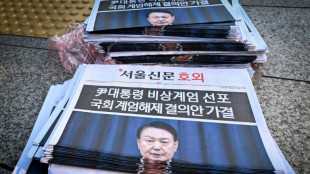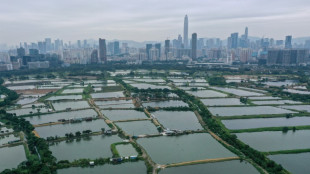
-
 Dutch F1 Grand Prix to end in 2026: organisers
Dutch F1 Grand Prix to end in 2026: organisers
-
Gunman held after failed attack on Sikh leader in India

-
 Pakistan recall Babar Azam for South Africa tour, Sajid Khan out
Pakistan recall Babar Azam for South Africa tour, Sajid Khan out
-
Seoul stocks sink amid S. Korea drama as Asian markets mixed

-
 French appeals court to rule in Polanski defamation case
French appeals court to rule in Polanski defamation case
-
Death toll rises to 29 in southern Thailand floods

-
 South Korean opposition move to impeach president after martial law bid
South Korean opposition move to impeach president after martial law bid
-
Trump's vows of quick peace fall flat on Ukraine frontlines

-
 Soldiers vs office chairs: South Korea's martial law standoff
Soldiers vs office chairs: South Korea's martial law standoff
-
Japan's Premier League pioneer Inamoto retires aged 45

-
 Second major Myanmar rebel group calls for talks with junta
Second major Myanmar rebel group calls for talks with junta
-
FIFA to reveal Club World Cup draw amid apathy, legal threats

-
 Taiwan's Lai arrives in Tuvalu to shore up Pacific allies
Taiwan's Lai arrives in Tuvalu to shore up Pacific allies
-
South Korean president pressed to step down over martial law bid

-
 Huge Vietnam fraud case raises questions over banking system
Huge Vietnam fraud case raises questions over banking system
-
Ghana thrusts economy into limelight in tight race for president

-
 Philippines says China Coast Guard fired water cannon, 'sideswiped' govt vessel
Philippines says China Coast Guard fired water cannon, 'sideswiped' govt vessel
-
Vietnam pushes electric motorbikes as pollution becomes 'unbearable'

-
 Seoul stocks sink amid S. Korea drama as Asian markets struggle
Seoul stocks sink amid S. Korea drama as Asian markets struggle
-
Hong Kong mega development plan to devour villages, wetlands

-
 French government risks falling in no-confidence vote
French government risks falling in no-confidence vote
-
Stokes fit as England name unchanged team for 2nd New Zealand Test

-
 Djokovic to begin bid for 25th Grand Slam crown in Brisbane
Djokovic to begin bid for 25th Grand Slam crown in Brisbane
-
Life has 'disappeared': Mexican city reeling from cartel infighting

-
 IXOPAY and Aperia Compliance Merge to Extend Advanced Payment Data Security to Merchant Acquirers and Merchants of All Sizes, Worldwide
IXOPAY and Aperia Compliance Merge to Extend Advanced Payment Data Security to Merchant Acquirers and Merchants of All Sizes, Worldwide
-
S.Korea political upheaval shows global democracy's fragility - and resilience

-
 Van Nistelrooy off to winning start at Leicester, Palace beat Ipswich
Van Nistelrooy off to winning start at Leicester, Palace beat Ipswich
-
Global stocks end mostly up with DAX crossing 20,000 for 1st time

-
 Georgia's ombudsman accuses police of torturing pro-EU protesters
Georgia's ombudsman accuses police of torturing pro-EU protesters
-
Norway, Sweden win big to reach Women's Euro 2025

-
 Partner of ex-Abercrombie & Fitch CEO pleads not guilty to sex trafficking
Partner of ex-Abercrombie & Fitch CEO pleads not guilty to sex trafficking
-
Leverkusen eliminate Bayern from German Cup after Neuer sees first red

-
 Syria rebels 'at gates' of central city Hama
Syria rebels 'at gates' of central city Hama
-
Amazon launches AI models to challenge rivals

-
 Bolivian ex-president, who fled to US, sentenced to six years prison
Bolivian ex-president, who fled to US, sentenced to six years prison
-
Bayern's Neuer sent off for first time in 866-game career

-
 Namibia elects its first woman president
Namibia elects its first woman president
-
Scottish artist Jasleen Kaur wins 2024 Turner Prize

-
 Barca hit five as they return to winning ways at Mallorca
Barca hit five as they return to winning ways at Mallorca
-
S. Korea president says will lift martial law

-
 Olympic champion Evenepoel breaks hand, shoulder in postal van collision
Olympic champion Evenepoel breaks hand, shoulder in postal van collision
-
Syria rebels advance on central city

-
 S. Korea's President Yoon, embattled conservative
S. Korea's President Yoon, embattled conservative
-
UK museum in talks with Greece over 'long-term' deal for Parthenon Marbles

-
 What we know about South Korea's martial law
What we know about South Korea's martial law
-
Biden announces $1 bn for Africa during maiden trip

-
 Retailers point to solid US sales over holiday weekend
Retailers point to solid US sales over holiday weekend
-
Europe-loving Blinken on last trip to NATO before Trump handover

-
 Seeking a new way of life under the sea - and a world record
Seeking a new way of life under the sea - and a world record
-
Defying headwinds, German stocks hit milestone


Cash crunch pushes Libyans to bank cards despite hurdles
In Libya, a shortage of cash in the banking system has pushed many to turn to cards for payments after more than a decade of war and instability has hammered the country's financial system.
Across most Libyan cities, withdrawing money is akin to an obstacle course in which hundreds wait, often for hours, outside heavily guarded banks for a turn to take out cash.
But the money all too often runs out early due to short supply.
Mistrust in that system means money is rarely reinjected back into banks, with Libyans preferring instead to keep cash on hand.
And while cashless culture has yet to take root, "the younger generations are easily adopting it", said Abdullah al-Gatet, an employee at a bank in Misrata, the country's third largest city.
Withdrawals at bank counters are capped at 1,000 dinars ($206) each time.
This, along with the cash shortage, means civil servants who make up the bulk of Libya's working population often receive their salaries late.
There is a growing awareness among Libyans of "the importance of electronic solutions to facilitate daily transactions, especially in times of liquidity crisis", said 30-year-old Gatet, "even if the infrastructure is still insufficient".
- Shift in awareness -
Libya has been wracked by instability and conflict since the 2011 NATO-backed uprising that overthrew and killed longtime dictator Moamer Kadhafi.
It is currently divided between a United Nations-recognised government in the capital Tripoli and a rival administration in the east backed by general Khalifa Haftar.
In Misrata, a major port city and commercial hub about 200 kilometres (120 miles) from Tripoli, the population of 400,000 are increasingly signing up to receive bank cards.
But the shift towards cash-free transactions is not without stumbling blocks.
There are few ATM machines and many vendors do not accept card payments as they are not equipped with payment terminals.
Economist Khaled al-Delfaq, 42, said that while the shortages have pushed many to shift to using cards, there needs to be an accompanying shift in awareness, and work needs to be done to "make these services more accessible".
But in the seeming absence of other options, many have already been converted.
Among those are Mohamed al-Soussi, who was shopping for his family at a supermarket in Misrata.
"Transactions are more simple with the card. I don't need to carry large wads of cash with me anymore," he said.
- Divided central bank -
Libya's political upheaval has also precipitated another strange side-effect -- multiple prints of 50-dinar banknotes.
Libya's institutions have since 2014 been caught between the two camps vying for power in the oil-rich country, and its central bank is no exception.
Until last year, it had been split in two, with an internationally recognised headquarters in the capital and another in the east, with each printing bills signed off by their respective governors.
In 2012, new 50-dinar bills, the largest available denomination, were put into circulation to make life easier for consumers who often make cash payments in the thousands.
But last April, the central bank announced the withdrawal of those notes from circulation due to the proliferation of counterfeits.
"The situation became even more complicated with businesses refusing the 50-dinar bills," said Moussab al-Haddar, a 45-year-old teacher who was visiting his bank branch to request a card.
The central bank had initially set a deadline for the end of August for the notes to go out of circulation, before extending it to the end of the year.
In a bid to address the current crisis, the bank injected 15 billion dinars into the system in late October, while urging banks to facilitate the issuing of cards to clients.
W.Lapointe--BTB
